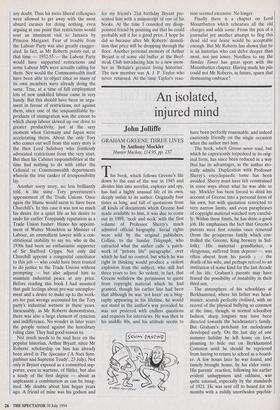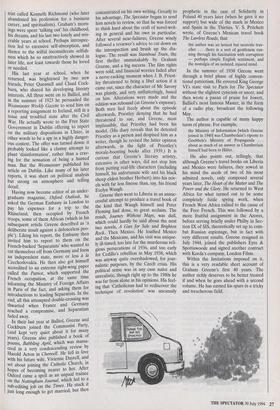An isolated, injured mind
John Jolliffe
GRAHAM GREENE THREE LIVES by Anthony Mockler Hunter Mackay, £14.95, pp. 237 his book, which follows Greene's life down to the end of the war in 1945 and divides him into novelist, explorer and spy, has had a highly unusual life of its own, deeply unfair to its author. Originally four times as long, and full of quotations from all kinds of documents which Greene had made available to him, it was due to come out in 1989, 'neck and neck' with the first volume of Professor Sherry's much admired official biography. Serial rights were sold by the original publishers, Collins, to the Sunday Telegraph, who extracted what the author calls 'a patch- work of "private life" paragraphs', over which he had no control; but which he was right in thinking would produce a violent explosion from the subject, who still had three years to live. So violent, in fact, that Greene withdrew the permission to quote from copyright material which he had granted, though his earlier line had been that although he was 'not keen' on a biog- raphy appearing in his lifetime, he would not stand in the author's way provided he was not pestered with endless questions and requests for interviews. He was then in his middle 80s, and his attitude seems to have been perfectly reasonable, and indeed cautiously friendly on the single occasion when the author met him.
The book, which Greene never read, but which he capriciously torpedoed in its orig- inal form, has since been reduced in a way that has its advantages, as the author sto- ically admits. Duplication with Professor Sherry's encyclopaedic tome has been avoided. Sherry must have felt constrained in some ways about what he was able to say. Mockler has been forced to distil his account of Greene into a personal form of his own, but with quotation restricted to very narrow limits, and even paraphrases of copyright material watched very careful- ly. Within these limits, he has done a good job. He emphasises the fact that Greene's parents were first cousins once removed (from the prosperous family which con- trolled the Greene, King brewery in Suf- folk). His maternal grandfather, a clergyman, suffered from depressi-,i. was often absent from his parish a r the death of his wife, and perhaps retired to an institution of some kind for the last decade of his life. Graham's parents may have feared the possibility of instability in their third son.
The atmosphere of his schooldays at Berkhamsted, where his father was head- master, sounds perfectly civilised, with no record of the physical bullying so common at the time, though, in normal schoolboy fashion, sharp tongues may have been directed towards the headmaster's family. But Graham's penchant for melodrama developed early. On the last day of one summer holiday he left home on foot, planning to hide out on Berkhamsted Common until he should be reprieved from having to return to school as a board- er. A few hours later he was found, and tamely brought home, by his elder sister. His parents' reaction, following his earlier evident unhappiness and oddness, was quite unusual, especially by the standards of 1921. He was sent off to board for six months with a mildly unorthodox psychia- trist called Kenneth Richmond (who later abandoned his profession for a business career, and spiritualism). Graham's morn- ings were spent 'talking out' his childhood, his dreams, and his last two lonely and mis- erable years at school. Perhaps introspec- tion led to excessive self-absorption, and thence to the wilful inconsiderate selfish- ness which he so unattractively showed in later life, not least towards those he loved or needed.
His last year at school, when he returned, was brightened by two new friends, Peter Quennell and Claud Cock- burn, who shared his developing literary interests. All three went on to Balliol, and in the summer of 1923 he persuaded the Westminster Weekly Gazette to send him on a reporting assignment to Ireland, still in a tense and troubled state after the Civil War. He actually wrote to the Free State Government in Dublin offering to report on the military dispositions in Ulster, in other words to be a spy in a highly danger- ous context. The offer was turned down: it probably looked like a clumsy attempt to plant 'disinformation', rather than a crav- ing for the sensation of being a hunted man. But the Westminster published his article on Dublin. Like many of his later reports, it was short on political analysis but strong on atmosphere and telling detail.
Having now become editor of an under- graduate magazine, Oxford Outlook, he asked the German Embassy in London to pay his expenses for a trip to the Rhineland, then occupied by French troops, some of them African (which in his subsequent article Greene described as 'a deliberate insult against a defenceless peo- ple'). Liking his report, the Embassy then invited him to report to them on the French-backed 'Separatists' who wanted to cut themselves off from Germany and form an independent state, more or less a la Czechoslovakia. He then also got himself accredited to an extreme right-wing paper called the Patriot, which supported the French occupation, at the same time informing the Ministry of Foreign Affairs in Paris of the fact, and asking them for introductions to leading Separatists. In the end, all this attempted double-crossing was thwarted when France and Germany reached a compromise, and Separatism faded away. In their last year at Balliol, Greene and Cockburn joined the Communist Party, (and kept very quiet about it for many years). Greene also published a book of poems, Babbling April, which was massa- cred in a very condescending review by Harold Acton in Cherwell. He fell in love with his future wife, Vivienne Dayrell, and set about joining the Catholic Church, in hopes of becoming nearer to her. After Oxford came a spell as an unpaid trainee on the Nottingham Journal, which led to a sub-editing job on the Times. He stuck it just long enough to get married, but then concentrated on his own writing. Greatly to his advantage, The Spectator began to send him novels to review, so that he was forced to think hard about the craft of novel-writ- ing in general and his own in particular. After several near-failures, Greene wisely followed a reviewer's advice to cut down on the introspection and brush up the dia- logue. The result was Stamboul Train, the first thriller unmistakably by Graham Greene, and a big success. The film rights were sold, and financial worries faded after a nerve-racking moment when J. B. Priest- ley threatened to bring a libel action if it came out, since the character of Mr Savory was plainly, and very unflatteringly, based on him. Alterations were made and the edition was rebound (at Greene's expense).
Both men lied freely about the episode afterwards, Priestley denying that he had threatened to sue, and Greene, most implausibly, that Priestley had been his model. (His diary reveals that he detested Priestley as a person and despised him as a writer, though he revised the latter opinion afterwards, in the light of Priestley's morale-boosting books after 1939.) It is curious that Greene's literary artistry, extensive in other ways, did not stop him from putting real-life characters (including himself, his unfortunate wife and his black sheep eldest brother Herbert) into his nov- els with far less finesse than, say, his friend Evelyn Waugh. Greene then went to Liberia in an unsuc- cessful attempt to produce a travel book of the kind that Waugh himself and Peter Fleming had done, to great acclaim. The result, Journey Without Maps, was dull, which could hardly be said about the next two novels, A Gun for Sale and Brighton Rock. Then Mexico. He loathed Mexico and the Mexicans, and his visit was unique- ly ill-timed; too late for the murderous reli- gious persecutions of 1936, and too early for Cedillo's rebellion in May 1938, which was anyway quite overshadowed, for jour- nalistic purposes, by the Czech crisis. His political sense was in any case naïve and unrealistic, though right up to the 1980s he was far from alone in his opinions. His feel- ing that 'Catholicism had to rediscover the technique of revolution' was uncannily prophetic in the case of Solidarity in Poland 40 years later (when he gave it no support) but wide of the mark in Mexico and Spain in the Thirties. V. S. Pritchett wrote, of Greene's Mexican travel book The Lawless Roads, that
the author was an honest but neurotic trav- eller . . . there is a sort of gentleness run- ning through his fascination with corruption — perhaps simple English sentiment, and the nostalgia of an isolated, injured mind.
In the summer of 1938 Greene went through a brief phase of highly conven- tional patriotism. He covered King George VI's state visit to Paris for The Spectator without the slightest cynicism or sneer, and then wrote a paean of praise for Jowett, Balliol's most famous Master, in the form of a radio play, broadcast the following May.
The author is capable of many happy turns of phrase. For example,
the Ministry of Information [which Greene joined in 1940] was Chamberlain's riposte to Goebbels's Ministry of Propaganda . . about as much of an answer as Chamberlain himself had been to Hitler.
He also points out, tellingly, that although Greene's travel books on Liberia and Mexico were failures, they sowed in his mind the seeds of two of his most admired novels, only composed several years later, The Heart of the Matter and The Power and the Glory. He returned to West Africa for what turned out to be some completely futile spying work, when French West Africa rallied to the cause of the Free French. This was followed by a more fruitful assignment in the Azores, before serving briefly under Philby in Sec- tion IX of SIS, theoretically set up to com- bat Russian espionage, but in fact with very different results. Greene resigned in July 1944, joined the publishers Eyre & Spottiswoode and signed another contract with Korda's company, London Films.
Within the limitations imposed on it, this is a very readable short account of Graham Greene's first 40 years. The author richly deserves to be better treated if and when he goes ahead with a second volume. He has earned his spurs in a tricky and treacherous field.



















































 Previous page
Previous page